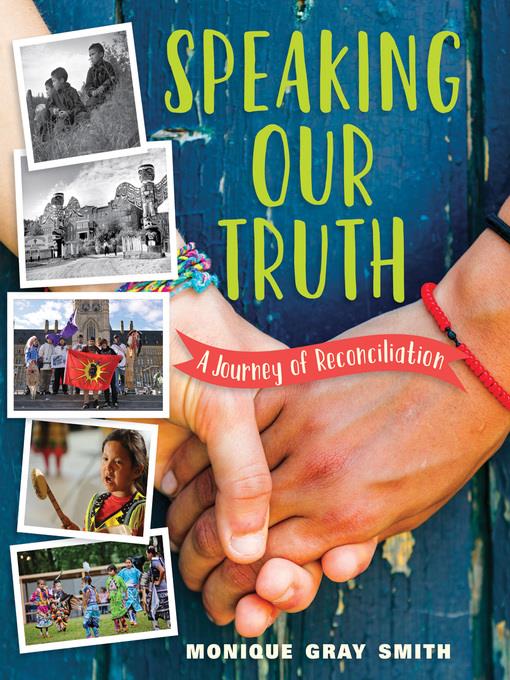
Speaking Our Truth
A Journey of Reconciliation
فرمت کتاب
ebook
تاریخ انتشار
2017
Lexile Score
1050
Reading Level
6-9
نویسنده
Monique Gray Smithناشر
Orca Book Publishersشابک
9781459815858
کتاب های مرتبط
- اطلاعات
- نقد و بررسی
- دیدگاه کاربران
نقد و بررسی

Starred review from August 21, 2017
Smith (My Heart Fills with Happiness) thoroughly and compassionately examines the history and traumatic aftereffects of Canada’s residential schools, the longest-running of which only closed in 1996. The forced relocation of indigenous children into these schools over a period of more than 160 years—separating them from their families and culture, and frequently subjecting them to harsh punishments, as well as physical and sexual abuse—is a subject that needs to be faced head-on, Smith explains: “It is critical for us as a country to tell his truth and for you as a young citizen to know this history.” She assumes readers are coming to the book without prior knowledge, and she clearly describes the history behind the schooling system and how its abuses came to light while defining relevant terms (assimilation, Indian agent, systemic racism, etc.). Period photographs and accounts from living survivors of the schools make a gripping narrative all the more real, and reader-directed questions appear frequently in sidebars. Smith informs without overwhelming or sugarcoating, and she emphasizes the power readers themselves possess: “I hope you see that we have a beautiful opportunity for profound change.” Ages 9–13.

September 1, 2017
Gr 4-7-A sensitive and extensive insight into the experiences of Indigenous people in Canada. Smith traces the historical events, movements, and laws affecting people of the First Nations and connects this history to the impact still resonating generations later. The book largely addresses the laws that forcibly removed Indigenous children from their families and sent them to residential schools in an attempt to "civilize" them. Replete with primary sources, including photos and personal accounts from those who lived in the residential schools, Smith tackles difficult and complex conversations with straightforwardness and compassion. These topics include institutionalized racism, forced sterilization, and the destruction of Indigenous cultures. Despite the somber topic, Smith consistently empowers readers to be agents of change and provides specific suggestions to take action. Smith wrote this book in the second person, which creates a uniquely personal experience wherein readers are immersed in the conversation. In addition, questions for reflection are peppered throughout, making the work very accessible for classroom use. Though Smith does not specifically address U.S. history, many of the laws and actions described in Canada have been and are mirrored in the United States. The thorough back matter also makes this volume great for research. For older readers, this work pairs nicely with Roxanne Dunbar-Ortiz's An Indigenous Peoples' History of the United States. VERDICT Purchase this vibrant, must-have title to prompt critical thinking and open discussions.-Paige Rowse, Needham High School, MA
Copyright 2017 School Library Journal, LLC Used with permission.

Starred review from July 1, 2017
Smith offers readers a sojourn through Canadian history chronicling the residential school experience through the stories of the survivors. For over 150 years, thousands of indigenous children were forcibly taken by Canadian government officials and provided with an education that would eradicate the cultural identities of indigenous peoples. Children in these residential schools were malnourished, endured physical and sexual abuse, and were forbidden to speak their languages or practice their own spirituality. Many died. Following a formal apology from the Canadian government in 2008, survivors of this experience were allowed for the first time to publicly voice their stories for official documentation. In vignettes threaded throughout, individual survivors reflect on the impact that this cultural genocide had on their individual lives and within their communities. Generations of trauma led to destructive patterns of behavior, mental illness, and addictions. Smith (of Cree, Lakota, and Scottish heritage) includes messages of resilience from community leaders and elders and devotes an entire chapter to interviews with young people as they express how important it is for them to contribute to the healing of their communities. One survivor says, "Reconciliation is asking myself who my Ancestors were the day before they went to residential school, then doing everything I can to return to that." Smith's book is an effort that returns, offering diverse voices that invite the world into the reconciliation experience. Absolutely necessary. (Nonfiction. 10-16)
COPYRIGHT(2017) Kirkus Reviews, ALL RIGHTS RESERVED.

























دیدگاه کاربران